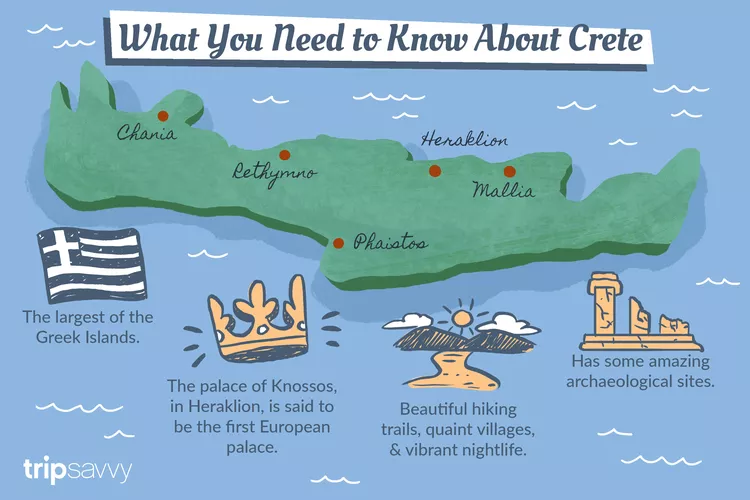Content Summary
Crete is a popular Greek Island packed with rural charm, famous archaeological sites, seaside towns with fabulous seafood, and caves of historic significance.
This guide will lead you through a hike in the deep and inspiring Samaria Gorge, a visit to the best archaeological sites in Greece, a countryside walk with a stop at the famous cave where Zeus is said to have been born, and insights into the cities themselves.
All of these activities can be accessed through inexpensive public transportation, eliminating the need for a rental car to navigate Crete’s narrow and winding roads.
Getting to Crete
Most visitors arrive in Crete by ferry, typically from Piraeus (the port of Athens). The journey takes approximately 9 hours on standard ferries, though newer options complete the trip in about 6 hours. Ferries arrive early in the morning, allowing travelers to save on hotel costs by sleeping onboard.
It’s advisable to arrive early for boarding, as the port can become quite hectic. Additionally, be flexible with your travel plans, as ferry service may be disrupted due to adverse weather conditions.
Ferry options include ports in Heraklion, Chania (which lands in Souda port), or Rethymno. Key ferry lines are Minoan, ANEK, and SuperFast.
Crete is also serviced by three airports: Heraklion (Nikos Kazantzakis Airport), Chania (the “K. Daskalogiannis” airport), and the newer Sitia Airport.
The Best Time to Go to Crete
While summer brings throngs of tourists and narrow paths, opting for the off-peak season is beneficial; however, visiting too early or late may reduce transportation options.
For an ideal experience, consider spending at least a week on the island, allowing time for relaxation and exploration without the rush of a short trip.
Heraklion, Greece Average Temperatures
:max_bytes(150000):strip_icc():format(webp)/heraklion-temperature-chart-56a3a33f5f9b58b7d0d2f3fa.png)
The chart above depicts historic average temperatures for Heraklion. As observed, summer temperatures can be warm, but avoiding July and August can offer cooler nights. The shoulder months of September and October, alongside May and early June, are particularly pleasant.
Heraklion Average Rainfall
:max_bytes(150000):strip_icc():format(webp)/heraklion-rainfall-chart-56a3a33f5f9b58b7d0d2f3fd.png)
The average rainfall in Heraklion highlights a typical Mediterranean climate, featuring wet winters and dry summers. Notably, July and August usually see little to no precipitation.
About Crete
:max_bytes(150000):strip_icc():format(webp)/crete-map-56a3a3dd5f9b58b7d0d2f85a.jpg)
This small map illustrates Crete’s geography, revealing that its larger towns predominantly lie along the northern coast. The blue lines depict the numerous ferries departing for Piraeus and other islands.
Crete is the largest of the Greek Islands, once the center of the Minoan civilization from around 2700 to 1420 BC. The island measures 160 miles (260 kilometers) from west to east and ranges up to 37 miles in width. Heraklion serves as the largest city with over 100,000 residents, followed by Chania which has around 50,000 inhabitants.
Crete’s rich history is colored by the many cultures that have inhabited the island, including the Minoans, Mycenaeans, Romans, and Byzantines. The Archaeological Museum of Heraklion offers a deep dive into this fascinating history.
Western Crete: Chania and the Samaria Gorge
:max_bytes(150000):strip_icc():format(webp)/western-crete-map-56a3a3fb5f9b58b7d0d2f8ea.jpg)
Chania, one of Crete’s largest towns, is famed for its delightful seafood served at charming harbor-side restaurants. For those looking to stay active, hiking through the breathtaking Samaria Gorge is a rewarding experience, particularly during the off-season.
The Samaria Gorge is a majestic gorge in the National Park of Samaria. It’s important to start early to avoid the crowds of up to 3,000 people in peak summer.
Most budget travelers can take a one-hour KTEL bus from Chania to Omalos, then walk to the trailhead. If needed, organized tours to the Samaria Gorge are also available from various cities in Crete.
Be sure to wear sturdy shoes for the rocky paths and carry a water bottle, as there are springs along the way to refill.
Central and Western Crete: Knossos, Lassithi Plateau, and Phaistos
:max_bytes(150000):strip_icc():format(webp)/central-crete-map-56a3a3fb5f9b58b7d0d2f8ed.jpg)
Central Crete is rich in archaeological sites, offering opportunities for hiking amid the scenic landscapes of the Lassithi plateau. A bus from Heraklion will easily connect you to the Minoan palace of Knossos, notable for its historical significance.
Although the palace has faced deterioration over the years, it remains a site of great intrigue. A combination ticket is available for those wanting to explore both Knossos and the Archaeological Museum in Heraklion for a comprehensive understanding of Minoan culture.
The Lassithi Plateau
The Lassithi Plateau is indeed picturesque, previously lined with traditional windmills that powered irrigation. Although many have been replaced by electricity, these remnants still echo the agricultural heritage of the region.
You can reach the plateau by a scenic drive from Neapoli or using the available bus services from Heraklion. Upon arrival, enjoy a leisurely walk around the ring road to explore the charming villages surrounding the plateau.
Don’t miss the Dikteon Andron cave, reputedly the birthplace of Zeus, located to the west of Phychro. Ensure to carry a flashlight and candles if you wish to visit.
Mallia
Mallia presents a blend of a bustling nightlife scene and an ancient Minoan palace, historically ruled over by Sarpedon, a son of Zeus.
Places to Stay
For those seeking accommodation, Heraklion offers numerous hotel options. Visitors will also find various vacation rentals along the waterfront, allowing easy access to local beaches.
Popular rental sites list over 800 options on Crete, from quaint cottages to luxurious villas. Many properties are reasonably priced, such as the Mirtos View Apartment Rental, which features small apartments within walking distance of not only the sea but also several family-run taverns.




